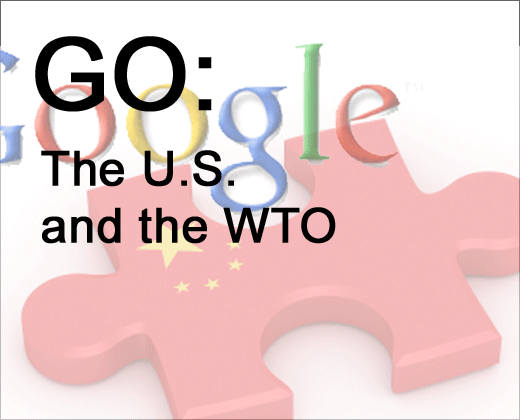Our Lora Bentley has compiled this list of the pros and cons of Google’s ultimate decision in its conflict with the Chinese government over censorship and suspected attacks against Google’s own interests. Stakes are high as the search giant decides its future in the world’s biggest market.
Click through for 10 key issues that will define Google’s huge decision.
The sixth principle on Google’s “Ten things” page states: “You can make money without doing evil.” It stands to reason that a company committed to avoiding evil would not want to stay in a communist country where it is required to participate in the oppression of Chinese citizens. Though the substance of this principle applies primarily to Google’s advertising practices, the general public does not necessarily know that. The company could face a public relations nightmare if it chooses to stay.
Google executives have said more than once they will not stand for or continue to comply with the censorship requirements put forth by the Chinese government, yet the government also refuses to budge. Google looks inept and weak if it backs down now.
Congress may pass legislation that would fine companies that don’t uphold basic human rights. If Google opts to stay in China, it could face serious fines and other penalties from its own government. And those fines would be in addition to the added regulatory scrutiny the company faces every time it proposes a merger or acquisition, given its dominant place in the search market.
The United States soon may be making a case against China before the World Trade Organization, arguing that its Internet censorship is an unfair barrier to international trade. Since Google was among those initially suggesting the WTO proceeding, it would not want to then participate in said barrier.
The hacks into Google’s network that started this entire discussion have been traced to China and perhaps even have ties to the Chinese government.
China boasts more Internet users than the entire U.S. population, and Google has recently gained significantly in that market, so there is substantial revenue to be gained.
There’s no guarantee that closing the search business in China won’t harm Google’s other interests there.
Google does not want to allow its global search competitors to gain a stronger foothold in the Chinese market. Consider the piece from The Huffington Post that doesn’t expressly say Google should stay, but indicates that Microsoft and other Google competitors would gain a huge advantage if the search giant picks up and goes home. How smart is that strategically?
Google doesn’t want to deal with the “repercussions” that Chinese officials keep threatening if it does leave, which necessarily would also affect the U.S. government’s relationship with China — or at least the Chinese government’s perception of the U.S.
Google’s presence in the country is still a “net positive” for information flow.Punishing Google users in China for what their government does or does not do is unfair.













